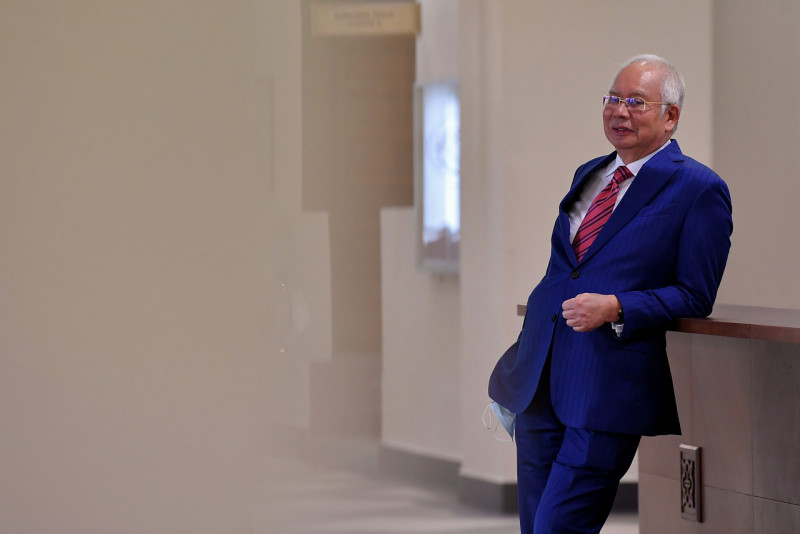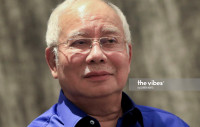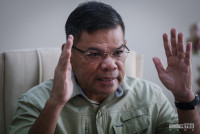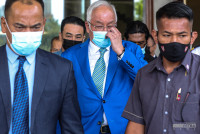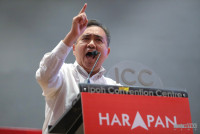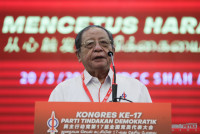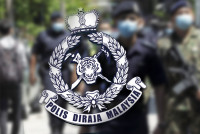
FOR those of us who have spent years on the front lines of the fight against corruption at the highest levels, the monumental 14th general election that ended 61 years of Barisan Nasional rule came as a sweet relief.
It is hard to overstate what a feat this was.
Money and corruption were voted out along with the once invincible Umno, which held power together with its smaller allies for six long decades.
The impossible became possible, hope replaced frustration, and a new enthusiasm enveloped the nation. It was not about Umno’s defeat, but that power was restored to the people.
Alas, the Pakatan Harapan government imploded.
Its rocky 22-month rule came to an abrupt end, following bickering, internal sabotage and a “deep state” syndrome previously warned of by one of its defectors. With the alliance of hope shattered, the promise of a more open, democratic and accountable Malaysia as contained in PH’s reform agenda went up in smoke.
Malay parties banded together to form Perikatan Nasional, which snatched power from the people’s hands and took over the government on March 1. Former prime minister Datuk Seri Najib Razak, Malaysia’s poster boy for corruption who faces a cumulative 72 years behind bars, is thriving again as Boss(ku).
PN politicians successfully promoted the narrative that PH was anti-Malay in its policies and governance, causing fissures within society and the latter coalition. This opened a path for Umno to return to power with new partners PAS and Bersatu.
The Covid-19 pandemic, which has brought the world to its feet, reached our shores right after PN wrested Putrajaya, deepening our despair.
Unlike other countries, Malaysia was deep diving in twin traumas: depressed jobs and public life, and the political turmoil blurred using tough crackdowns and strict restrictions.
More than RM250 billion has been spent on stimulus packages to help Malaysians who have lost their businesses or been laid off. Despite the colossal sum, not a sen was subjected to parliamentary approval or a proper oversight mechanism.
Emergency procurement practices were carried out with corners questionably cut, and they are now under Malaysian Anti-Corruption Commission investigation.
And, countless calls for emergency parliamentary sittings were shunned by the PN government, which lacks a convincing majority, mainly to avoid a possible no-confidence vote.
Rising corruption
We were only just recovering from the aftermath of the 1Malaysia Development Bhd scandal, toiling through asset recovery efforts and numerous criminal charges, when suddenly, we found corrupt politicians back in power through unscrupulous means.
The familiar and dreaded past returned, and with that, good governance was binned.
Here is a list of the reasons why we are deeply disturbed by the steady erosion before us.
Firstly, Prime Minister Tan Sri Muhyiddin Yassin worked swiftly to control ownership of government-linked companies with a slew of political appointments, replacing professionals with allies and loyalists.
Next was judicial tumult, when Malaysian courts dropped countless charges linked to 1MDB, starting with Najib’s stepson, Riza Aziz, being acquitted of all counts of corruption and money-laundering.
Then, former Sabah chief minister Tan Sri Musa Aman had his 46 graft and money-laundering charges dropped.

Activists, including those against corruption, got the short end of the stick, however. We were promptly punished for critical comments, with some of us dragged to police stations and sued.
The free media became a casualty, with global news agency Al Jazeera harassed and chastised for reporting on the poor treatment of migrant workers during the coronavirus lockdown.
With the backstage power-broking at a feverish pace, state governments were falling like flies and changing hands rapidly.
Horse-trading seemed to be the order of the day. From Kedah to Sabah, crossovers were manoeuvred.
A failed power grab in Sabah triggered the dissolution of the state assembly, and shocking accounts of millions of ringgit being offered to reps surfaced.
Money politics still thrive
How did money politics become the harbinger of an election – and its outcome?
Existing disclosure requirements do not adequately restrict covert political funding or ensure electoral fair play.
The problem centres around the cosy nexus between business and politics.
“First, Malaysia is one of the very few countries where parties own corporate enterprises, a trend known as ‘political business’. Second, money-based factionalism, known as ‘money politics’, is threatening the existence of parties and undermining public confidence in government leaders. Party factionalism is based not on ideological differences, but on which political leader has the greatest capacity to distribute funds to capture grassroots-level support. These two core issues contribute to the extensive monetisation of politics.” – Prof Terence Gomez, Universiti Malaya Economics Faculty
Although the Election Offences Act 1954 limits campaign expenditure for individuals contesting a parliamentary seat (RM200,000) and a state seat (RM100,000), there is no cap on how much a party can spend during an election. And, there is no curb on foreign funding.
Parties are governed by the Societies Act 1960, so even though they are required to submit their audited financial statements to the Registrar of Societies, they are not obligated to reveal their donation sources.
The lack of transparency and accountability surrounding political funding, coupled with the absence of a legal framework, lends credence to suspicions of money’s influence on politics and policy.
Reform efforts
Civil society has long called for political financing laws to be introduced.
In 2015, massive protests were held following a 1MDB expose on RM2.6 billion that flowed into Najib’s personal bank account, leading the government to establish the National Consultative Committee on Political Financing.
The Political Donation and Expenditure Act was mooted, but the BN administration made no moves to execute any of the report’s recommendations.
In the lead-up to GE14, PH included in its election manifesto a commitment to introduce a Political Financing Control Act that would require a formula-based state funding of parties, sources of funding to be identified and audited accounts made available, and a ban on parties owning assets above RM1 billion and GLCs making political donations.
Tun Dr Mahathir Mohamad, heading the PH government, set in motion the drafting of the law, and in January last year, launched the National Anti-Corruption Plan, in which Putrajaya pledged to “introduce new legislation governing political funding and include an offence on lobbying” by December 2020.
With The Vibes’ launch last Saturday in the thick of the Sabah election campaign, we hope it will serve as a vehicle to create checks and balances to keep parties accountable, and provide greater transparency on political financing and efforts to curb corruption.
The political patronage system that has governed Malaysia for decades must be abolished for the nation to move forward. – The Vibes, September 22, 2020
Cynthia Gabriel is founder and executive director of the Centre to Combat Corruption and Cronyism, and was a member of the government-appointed 1Malaysia Development Bhd investigative panel and National Anti-Corruption Action Plan drafting committee. She has received awards, both local and international, for her work fighting corruption at the highest levels in Malaysia.



